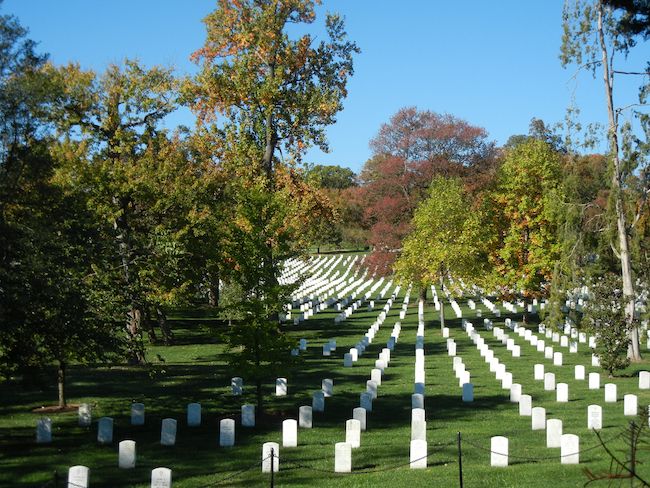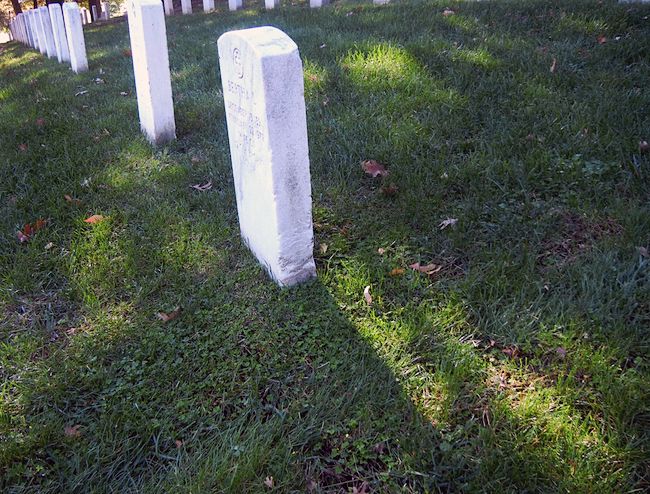
From the Memorial Bridge between Arlington National Cemetery and the Lincoln Memorial. That's Georgetown in the distance on the left side of the pic. The tower on the right is in Silver Spring, MD. I think. Or maybe it's Tenleytown.
As a "women's lib" era feminist, I was furious at the patriarchal culture that forced women back into the home after WWII to have babies while the returning soldiers took their jobs. The Feminine Mystique, by Betty Friedan, still boils my ass. Grrrrr!
It's always convenient to have a target when in a mood to vent one's spleen and I should say I'm not the only person in history to point the finger. During the late 60s and 70s, as our society began to wake up from the post WWII culture-wide shock and denial, from the repression of our grief, well, we were mad as hell and weren't going to take it anymore. The newly awakened are often irracible. We definitely were. In fact, this is the first time I've ever tried to see the big picture, the reasons why the 50s were so weird. My eyes are open and I am learning so much!

Right after WWII, no one thought in terms of a "new normal," as we do now. A few people understood the world had changed forever, but I'm not clear how many people could understand the reality that, as a whole, the western European and American psyche was in deep shit, in literal shock. I'm talking about the oversoul of our culture. It was whacked.
What society could spring back immediately following the killing of sixty million people, witnessing the devastation of the atomic bomb, the Holocaust, too? Who could manage to obediently go back to the way it was after all the scrimping and starving, the worry, loss, and other hardships? I mean really.
What society could spring back immediately following the killing of sixty million people, witnessing the devastation of the atomic bomb, the Holocaust, too? Who could manage to obediently go back to the way it was after all the scrimping and starving, the worry, loss, and other hardships? I mean really.
But we won the war, so we were supposed to be content, reassume the roles we played prior to WWII and carry on as if nothing had happened. Though we beat the Axis powers, no one was the winner in that war. Probably there is no such thing as winning a war.

Speaking of which: there was no such thing as a Ward Cleaver. He and other characters in film and on TV played the role of the gentle paternal figure, bringing home the bacon and playing baseball with the kids on the weekend. Ward was a pop up, two dimensional character, the mild mannered father who follows the rules, is centered and balanced. Ward was a fantasy, a form of post-war propaganda meant to convince people that everything would be fine if only they would live their lives according to the rules. At least this is some of what the ghosts were telling me today at Arlington.
Character was seen as a very important quality at that time. Part of having character involved self control. Talk therapy was seen as only for the very seriously mentally ill. And anyway people weren't supposed to dwell on the horror of it. They felt it was best to put it behind them as soon as possible. Hence the men came back, drank, smoked cigarettes, and tried not to think too much about it. The women, too. In addition, the women had babies. Lots and lots of babies, including me. It was during the 50s that we became so obsessed with shopping. We started accumulating stuff then, trying to fill the darkness with cheerful, happy things.
The new normal worked better for some, not so well for others. I don't think my parents had such an easy time with the transition. They were tender hearted people who hoped to do good in the world. At last and finally in my life I am thinking about how hard it was for them, not only dealing with the shock at the end of the war, but they were also targeted as suspicious by McCarthy's Un-American Activities Committee. As dangerous Commies, it was hard for them to find work of any kind.
What a crazy weird time to come into the world, good lord. No wonder we Boomers are who we are. I have a lot to say about this, but this is enough for now. Shalom.


4 comments:
Ward Cleaver was indeed a caricature, but his show didn't even appear until 1957, 12 years after the end of the war. It seems like American society actually grew more conformist as the '50s progressed.
It wasn't until all those baby boom kids became rebellious teenagers and college students that the world really began to shake -- a phenomenon that I think was related more to vast quantities of young people than anything else.
Well, being of the same generation but growing up in after-war Germany, you might think we were very different, but we weren`t! No one spoke much about the war, we only heard rumors, horrible stories, but also denial. We saw tha ruins, the wounded people in the streets, with lost arms and legs, the fathers who did not speak - but there were we, full of hunger for life. We loved American music and tried to look cool and travel to see the world. In the 68 movement we turned around and for the first time asked our fathers - What have YOU done? It was a crazy, weird time, but we have tried to learn from the disaster which we had inherited. Talk with Germans, you will see what I mean.
Angela, I have. When I was in Germany in 1979 I talked to many Germans of about my age. It was really a revelation!
Steve - critical mass made the 60s? I think it was a lot more complicated than that. We are in a moment right now that feels similar, the energy that is.
Did we grow more conformist or did we try harder and harder? Before Ward there was the Donna Reed Show and Father Knows Best.
What a weird decade! Good lord.
What I think was wierd was this total respect for all the pockets of insular families with their children (usually three it seems!)where so much was dysfunctional but nobody outide that bubble, even extended family, felt they had the right to say . So much emotional damage was hidden behind those picket fences.
Now there are aspects just as damaging but people are held more accountable.
It's a subject I feel strongly about - don't get me started on men who came back from that war without counselling, and morphed into emotionally remote fathers who's new terror was a son who was not a "man's man" - the sort of father portrayed by Brad Pitt in the Tree of Life.
No doubt they were bringing up their children to have the toughness to face life as they'd seen it.
I loved the way this subsequently played out in the 60's when the generations clashed, and now seems to have come full circle to an understanding of why there were difficulties and mistakes by church and society at the time, and at least an effort to heal the wounds.
Yes, there were lots of positives but as you say, very strange and repressive aspects too. Things that were seen as straightforward in those days ie adoption have in time, shown that greater care and consideration is needed - a more intelligent approach than the
black and white '50's.
Wonder what future generations wil make of these first 12 years of the 21st century!! No matter the century, each would have been made better by 'right speech - and practicing a good heart'.
Post a Comment